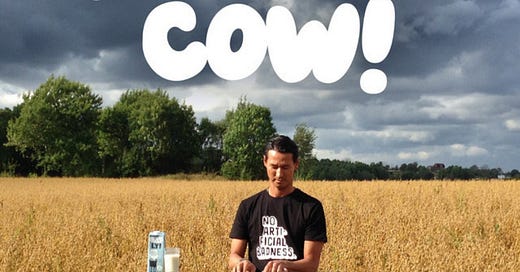One week in a post #46: Carbon Labeling Fights, Buckwheat Rise, Banned Ingredients, Reality Checking Cultivation
Food and climate highlights on my radar!
[Three pieces of news]
🏷️ Carbon labeling: claims, Europe, Oatly.
Oatly is pushing the UK food and drink sector to implement carbon labeling on products to foster transparency and informed consumer choices, specifically pointing the finger towards the animal dairy industry. On the same direction, the EU is banning greenwashing and enhancing product durability information to protect consumers from misleading practices. In practice, this applies (among the others) to carbon intensive products that are labeling themselves as “carbon neutral” due to offsetting practices. Offsetting cannot be the only solution (!!); moreover, a shadow looms over offsetting efforts as a recent study reveals significant overestimation of emission reduction impact.
How can we discern genuine progress from mere green facades?
🚫 California bans some ingredients
California has enacted a ban on four ingredients commonly found in food products due to associated health concerns. The prohibited substances include:
butylated hydroxyanisole: usually found in preserved meats or chips, edible fats, dehydrated foods, baked goods, snacks, chewing gum;
potassium bromate: commonly added to baked goods such as bread, bagels and pastries to strengthen the dough;
perfluorooctanoic acid: dairy products, drinking water and seafood are the main sources of human exposure;
perfluorooctanesulfonic acid: egg, meat and dairy products are the main sources of human exposure.
❓Emerging considerations on cultivated meat
I found this article fascinating. There has been a tremendous hype surrounding the cultivated meat industry in the past years (and I’m a big fan!), and yet companies have failed to meet the high expectations set by their ambitious promises. The industry's reliance on hype to attract investments raises concerns about its sustainability and the potential disillusionment that could follow if the promised innovations continue to fall short. Listening to Green Queen podcast on this topic, it seems to emerge that founders see cultivated meat is “a” solution to our food crisis, and not “the only” solution; reaching scale is still many years off; the journey has so far been really hard and not everything they thought worked and would work has planned.This provokes several questions:
How can the cultivated meat industry balance the excitement generated by its potential with the reality of its current technological limitations?
What can other new radically new approach to food production learn from this?
How can transparency and realistic goal-setting be encouraged within emerging industries, especially when VC-backed?
[Three raises]
🔬 Plans bioengineering / Moolec Science secured $30 million to produce bovine and porcine proteins from plants. (how necessary?)
🌯 Mexican / Tia Lupita Foods raised $2.6 million seed funding to expand its presence in the better-for-you Mexican foods segment. (big fan!)
🍙 Packaging / Notpla has been awarded a £1 million grant to scale its Notpla Rigid solution, made from the fibrous by-product of industrially processed seaweed. (big fan!)
[Three products]
Following the top food trends by WholeFoods, this week:
🍔 Actual Veggies / Green Burger, returning to real vegetables in plant-based products;
💧 Blue Stripes / Urban Cacao Water to utilize the whole cacao plant;
🫓 Maine Crisp / Buckwheat Crackers to support soil health and provide a gluten-free alternative.



